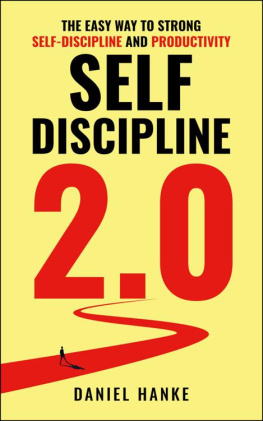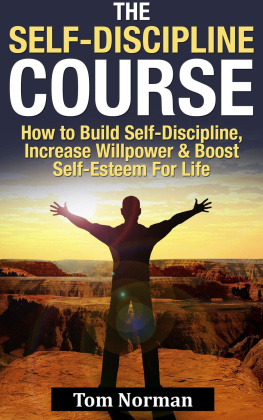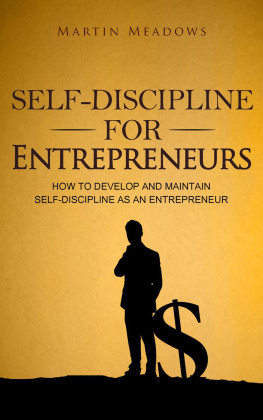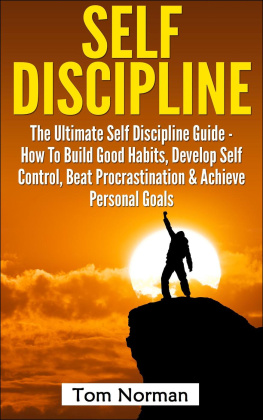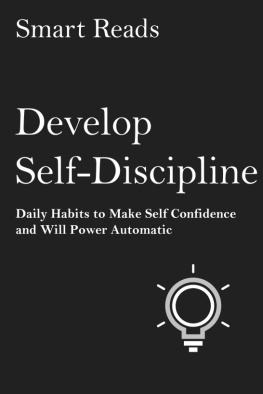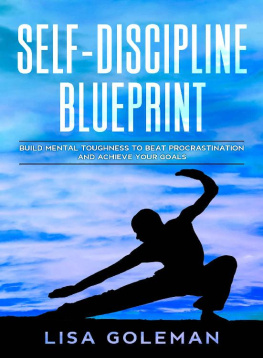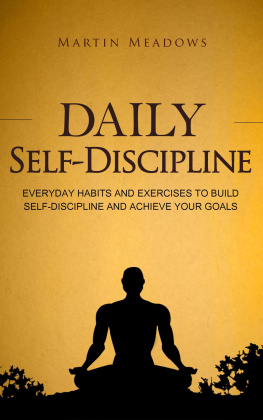Daniel Hanke
SELF-DISCIPLINE 2.0
The easy way to strong self-discipline and productivity
CONTENTS
My Greatest Insight
Introduction
There is only one success: to be able to spend your life in your own way.
Christopher Morley
O NE OF THE biggest problems of our time has the below elements.
People know what actions would move them forward in life, but they just can't bring themselves to do them.
They give in to many temptations; they just can't break bad habits, so they keep wasting their potential.
Afterward, they often feel guilty, and since guilt feels bad, they often displace that guilt by procrastinating even more.
This creates a vicious cycle that makes them more and more unhappy and dissatisfied.
Because they don't have the level of success they want, their self-confidence gets worse and worse.
The lower their self-confidence plummets, the harder it is to enjoy their life, achieve goals, and be happy.
To break out of the vicious circle, they eventually give up their goals and ambitions. They stop striving for more in life because they no longer want to be disappointed. They settle for a life far below their means.
At the end of their life, they look back full of regret at their unused potential. They feel the pain of 1,000 electric shocks at the thought of all the opportunities they left unused. In retrospect, they realize it would have been so easy to live out their own potential and lead a grandiose life.
What is the solution to this big problem? How do we manage to consistently live out our potential? How do we achieve our most ambitious goals as quickly and reliably as possible? How do we become as successful and happy as possible? There are many direct and indirect answers to these questions from many different people.
But if you have thought about it a lot and are honest, you must admit that for most people, the key is self-discipline. Without self-discipline, the best conditions, the best knowledge, and the best strategies are completely useless. Conversely, the more self-discipline you possess, the easier it is for you to excel in just about any area of your life. Since knowledge is more freely available than ever these days, you can acquire anything you need to become successful with self-discipline. The real bottleneck to success, whether professional or personal, is not knowledge, skills, money, intelligence, relationships, or fame; it is self-discipline .
But even regular self-discipline, as I call it, has its flaws. Self-discipline is considered synonymous with self-control and willpower, which implies that we must become stronger than our temptations. It suggests that we must conquer our inner demons, that we must constantly force ourselves to do the right thing, even when we don't feel like it at all.
But is this really the best approach? Do extremely successful people force themselves to succeed? Do they hate what they do and do it anyway? Or is it much more the case that they love what they do every day, which is why they do it again and again and thus reap great success as a by-product? What if it's not because of the activity, but because of the person themselves? What if we could learn to be just like them? What if we could direct and increase our motivation? Wouldn't that be the real key to happiness, success, productivity, and self-discipline?
A few years ago, these and similar questions ran through my mind. At the time, I had no idea what a deep obsession they would trigger in me. I felt at a fundamental level that the general recommendations about self-discipline were not so much wrong as inefficient. I did a lot of research, a lot of thinking, and a lot of experimenting. Over the years, a deep conviction solidified in me that we should not focus on willpower to cultivate strong self-discipline. Taking an ice-cold shower every day may increase one's willpower, but few can do so. The good thing is that we don't have to be able to do this at all. Most extremely successful people do not shower with ice-cold water for five minutes every day, yet they are still successful.
By the way, successful in this book doesn't just mean financial success; it's about success in all major areas of life, including relationships, health, and happiness. In my view, only people who are good in all areas lead a good life. On the other hand, those who are very good in all areas lead phenomenal lives. It was almost never pure willpower that enabled them to lead such a life. Much more likely, it was motivation . Or, to put it even more precisely, it was self-discipline based on motivation .
Willpower is limited. Not only has this been scientifically proven, but every adult has probably experienced it for themselves. For a while, we may be able to bring ourselves to do something we don't feel like doing, but eventually, reluctance wins, and we procrastinate. This is perfectly normal and nothing to be ashamed of. It's not your fault if you procrastinated; it was simply because your motivation wasn't on your side. Without motivation, tackling a challenging job is like sailing a ship into a headwind. By skillfully setting the sails or by rowing, the ship may still move forward, but it is difficult and exhausting. However, when motivation is on your side, the ship of your productivity has a tailwind. Great progress then happens almost by itself.
There are two forms of motivation. With extrinsic motivation, we do something because we want to achieve a desired goal. With intrinsic motivation, we do something because we enjoy the activity. Particularly the latter form is the key to achieving gigantic things in the long run. Imagine that you love a worthwhile task so much that you like nothing better than to pursue it. Great progress would then be almost effortless. We are happy to do our best and to put a lot of time into the valuable task if we enjoy it.
However, the problem here is obvious, and I already described it at the beginning. I think it's one of the biggest problems of our time that most people are not able to control their own motivation. We have control over more things than ever these days, yet most people lack control over the one thing that matters most: themselves!
Sometimes we are motivated to pursue important tasks, and we make great progress for a short time, then everything is good. But unfortunately, the tide often quickly turns. Motivation for meaningful activities dwindles, while the motivation for pointless time-wasting increases.
Some may have tried to control their own motivation, but because they didn't know what the most effective approaches were, they gave up. Others don't even believe it's possible to control their own motivation. For them, motivation is like the weather; it's sometimes good, sometimes bad, but never controllable. However, after more than four and a half years of intensive study of the subject, I can say unequivocally that motivation can be controlled very well. It can be directed and increased if you know how.
However, don't expect me to present you with a magic bullet, like, "Just do this one simple technique, and the rest will follow." There are already plenty of books that follow this basic pattern. I have never gained much from such all-in-one solutions. Instead, I have repeatedly observed that great improvements come only when many small and larger procedures are mastered and applied regularly.
I admit, it may take some work to read this book, to memorize the procedures, and to apply them regularly, but the long-term result will be worth it more than 1,000 times over. At first, I didn't want to write a book at all. I started looking into the subject purely out of self-interest. Then, slowly but surely, my self-discipline became so effortless, and my zest for life so great as a result that I couldn't help but share my knowledge with the world. I wanted to give everyone the chance to become a master of their own motivation. However, I didn't want to just reveal the knowledge; I wanted to do it in a very understandable and motivating way. And I hope that I have succeeded in this with Self-Discipline 2.0 .
Next page
